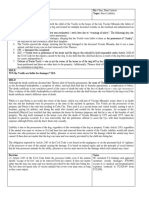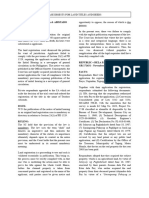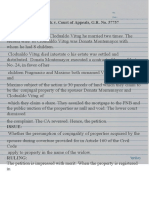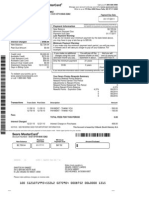Equitable Vs Palces
Equitable Vs Palces
Uploaded by
maria_catapang_2Copyright:
Available Formats
Equitable Vs Palces
Equitable Vs Palces
Uploaded by
maria_catapang_2Original Description:
Original Title
Copyright
Available Formats
Share this document
Did you find this document useful?
Is this content inappropriate?
Copyright:
Available Formats
Equitable Vs Palces
Equitable Vs Palces
Uploaded by
maria_catapang_2Copyright:
Available Formats
G.R. No.
214752, March 09, 2016
EQUITABLE SAVINGS BANK, (NOW KNOWN AS THE MERGED ENTITY "BDO UNIBANK,
INC.") Petitioner, v. ROSALINDA C. PALCES, Respondent.
PERLAS-BERNABE, J.:
The Facts
Respondent purchased subject vehicle through a loan granted by petitioner. Respondent executed a
Promissory' Note with Chattel Mortgage5 in favor of petitioner.
Respondent failed to pay 2 monthly installments, thereby triggering the acceleration and prompting
petitioner to send a demand to compel respondent to pay the remaining balance of the. As the demand went
unheeded, petitioner instituted a Complaint for Recovery of Possession with Replevin with Alternative Prayer
for Sum of Money and Damages10 against respondent. Pending respondent's answer, summons12 and a writ
of replevin13 were issued and served to her personally
In her defense,16 while admitting that she indeed defaulted on her installments for 2 months, respondent
insisted that she called petitioner regarding such delay in payment and spoke to a bank officer, who gave his
consent. In the succeeding months, respondent then paid her late installment payments amounting of
P103,000.
The CA ordered petitioner to return the amount of P103,000.00 to respondent. It held that while
respondent was indeed liable to petitioner under the Promissory Note with Chattel Mortgage, petitioner
should not have accepted respondent's late partial payments. The CA opined that by choosing to recover the
subject vehicle via a writ of replevin, petitioner already waived its right to recover any unpaid instalments,
pursuant to Article 1484 of the Civil Code.
Issue
Whether or not the CA correctly ordered petitioner to return to respondent her late installment payments.
The Court's Ruling
The CA erred in ordering petitioner to return the amount to respondent.
Article 1484 of the Civil Code governs the sale of personal properties in installments.
In this case, there was no vendor-vendee relationship between respondent and petitioner. Respondent never
bought the subject vehicle from petitioner but from a third party, and merely sought financing from
petitioner for its full purchase price. A loan contract with the accessory chattel mortgage contract - and not a
contract of sale of personal property in installments - was entered into by the parties with respondent
standing as the debtor-mortgagor and petitioner as the creditor-mortgagee.
Further, there is nothing in the Promissory Note with Chattel Mortgage that bars petitioner from receiving
any late partial payments from respondent. Petitioner's acceptance of respondent's late partial payments will
only operate to reduce her outstanding obligation to petitioner.
In sum, the CA erred in ordering petitioner to return the amount to respondent. In case foreclosure
proceedings on the subject chattel mortgage has not yet been conducted/concluded, petitioner is ordered to
commence foreclosure proceedings on the subject vehicle in accordance with the Chattel Mortgage Law, i.e.,
within thirty (30) days from the finality of the decision. The proceeds therefrom should be applied to the
reduced outstanding balance of respondent and the excess, if any, should be returned to her.
You might also like
- InsuranceDocument3 pagesInsuranceAnonymous jcCTbWMiNo ratings yet
- Insurance ReviewerDocument37 pagesInsurance ReviewerDiane91% (11)
- Aug 14 Cases - DigestsDocument11 pagesAug 14 Cases - Digestsmaria_catapang_2100% (1)
- Master Copy Utopia LMT 2022 - Ut 0121 - LaborDocument11 pagesMaster Copy Utopia LMT 2022 - Ut 0121 - LaborChristian TajarrosNo ratings yet
- 151 Alvero V Dela RosaDocument1 page151 Alvero V Dela Rosadwight yuNo ratings yet
- Commissioner Vs Magsaysay LinesDocument2 pagesCommissioner Vs Magsaysay LinesVerlynMayThereseCaroNo ratings yet
- Civil Procedure - Atty. Custodio AY 2018 - 2019 (1st Sem) Joan PernesDocument12 pagesCivil Procedure - Atty. Custodio AY 2018 - 2019 (1st Sem) Joan PernesGillian BrionesNo ratings yet
- Copioso Vs Copioso GR No. 149243 October 28, 2002 FactsDocument1 pageCopioso Vs Copioso GR No. 149243 October 28, 2002 FactsMarj LoNo ratings yet
- 12 - Edrada vs. Ramos, 468 SCRA 597, G.R. No. 154413 August 31, 2005Document7 pages12 - Edrada vs. Ramos, 468 SCRA 597, G.R. No. 154413 August 31, 2005gerlie22No ratings yet
- R61 6. Del Socorro vs. Van WilsemDocument6 pagesR61 6. Del Socorro vs. Van WilsemJessica AbadillaNo ratings yet
- 07 CIR Vs Algue INCDocument3 pages07 CIR Vs Algue INCjamNo ratings yet
- Collector V. Goodrich International Rubber Co.: By: Ellaine M. QuimsonDocument2 pagesCollector V. Goodrich International Rubber Co.: By: Ellaine M. QuimsonLudy Jane FelicianoNo ratings yet
- SALES - Engineering & DinoDocument3 pagesSALES - Engineering & DinoMariaAyraCelinaBatacanNo ratings yet
- 7 Sandejas vs. Lina PDFDocument13 pages7 Sandejas vs. Lina PDFjannahNo ratings yet
- Case Digests Property IDocument3 pagesCase Digests Property ITugs Victor de GuzmanNo ratings yet
- Part I - Association To CaltexDocument11 pagesPart I - Association To CaltexmonaileNo ratings yet
- Legarda Vs SaleebyDocument28 pagesLegarda Vs SaleebyAnonymous 7BpT9OWPNo ratings yet
- Property - 493 de Guia VS Ca PDFDocument5 pagesProperty - 493 de Guia VS Ca PDFXing Keet LuNo ratings yet
- Abilla Vs Gobonseng SALESDocument8 pagesAbilla Vs Gobonseng SALESdayneblazeNo ratings yet
- Balina-Digest-Atilano v. AtilanoDocument2 pagesBalina-Digest-Atilano v. AtilanoNamiel Maverick D. BalinaNo ratings yet
- CivPro Digests IIDocument5 pagesCivPro Digests IIAya BeltranNo ratings yet
- INFORMATION CYBERLIBELDocument3 pagesINFORMATION CYBERLIBELAna Marie Faith CorpuzNo ratings yet
- 17 - Hungman Yoc vs. Kieng Chiong SengDocument2 pages17 - Hungman Yoc vs. Kieng Chiong SengAres Victor S. AguilarNo ratings yet
- Phil Guaranty v. CIRDocument2 pagesPhil Guaranty v. CIR8111 aaa 1118No ratings yet
- Nego CaseDocument2 pagesNego CasemcfalcantaraNo ratings yet
- People of The Philippines, Plaintiff-Appellee, V. Al Madrelejos Y Quililan, Accused-Appellant. DecisionDocument5 pagesPeople of The Philippines, Plaintiff-Appellee, V. Al Madrelejos Y Quililan, Accused-Appellant. DecisionHumility Mae FrioNo ratings yet
- La Tondeña Distillers vs. PonferradaDocument2 pagesLa Tondeña Distillers vs. PonferradaAnakataNo ratings yet
- Remedial Law RedNotes PDFDocument66 pagesRemedial Law RedNotes PDFIlanieMalinisNo ratings yet
- G.R. No. 164051 Digested CaseDocument5 pagesG.R. No. 164051 Digested CaseAlheckzxsh DhannielNo ratings yet
- Nippon Express (Philippines) Corporation v. CIRDocument1 pageNippon Express (Philippines) Corporation v. CIRDaLe AparejadoNo ratings yet
- Tax 2nd WeekDocument12 pagesTax 2nd WeekLester BalagotNo ratings yet
- The Law On Alternative Dispute Resolution: Private Justice in The PhilippinesDocument12 pagesThe Law On Alternative Dispute Resolution: Private Justice in The PhilippinesNicco AcaylarNo ratings yet
- EUFEMIA EVANGELISTA VDocument3 pagesEUFEMIA EVANGELISTA VLina RheaNo ratings yet
- CaseDocument15 pagesCaseReiden VizcarraNo ratings yet
- Compilation Case Digests Tax 2Document15 pagesCompilation Case Digests Tax 2rgomez_940509No ratings yet
- Eternal Gardens Memorial Park V Philamlife Insurance Company PDFDocument15 pagesEternal Gardens Memorial Park V Philamlife Insurance Company PDFMiakaNo ratings yet
- Inadmissible HearsayDocument20 pagesInadmissible HearsayNate Abbagu FloresNo ratings yet
- Republic vs. FlorendoDocument2 pagesRepublic vs. FlorendoDivinekid082No ratings yet
- Involuntary Dealings Digest LTDDocument2 pagesInvoluntary Dealings Digest LTDLei MorteraNo ratings yet
- Northern Pacific R. Co. v. Babcock, 154 U.S. 190 (1894)Document10 pagesNorthern Pacific R. Co. v. Babcock, 154 U.S. 190 (1894)Scribd Government DocsNo ratings yet
- Rivera V OngDocument2 pagesRivera V OngClarence ProtacioNo ratings yet
- Carbonell V CA, GR L-29972, January 26, 1976 (Per J. Makasiar, First Division)Document3 pagesCarbonell V CA, GR L-29972, January 26, 1976 (Per J. Makasiar, First Division)Steve UyNo ratings yet
- QUIZ No. 2 - FJSGDocument7 pagesQUIZ No. 2 - FJSGAce GonzalesNo ratings yet
- BUS ORG - PAT - 5th Part of ConsolidationDocument15 pagesBUS ORG - PAT - 5th Part of ConsolidationEsraRamosNo ratings yet
- Case Name: Vestil v. IAC and Uy G.R. No. 74431 Date: November 6, 1989 By: Chua, Dane Larieze Topic: Strict LiabilityDocument2 pagesCase Name: Vestil v. IAC and Uy G.R. No. 74431 Date: November 6, 1989 By: Chua, Dane Larieze Topic: Strict Liability123abc456defNo ratings yet
- 5 - Ainza vs. Padua, 462 SCRA 614, G.R. No. 165420 June 30, 2005Document8 pages5 - Ainza vs. Padua, 462 SCRA 614, G.R. No. 165420 June 30, 2005gerlie22No ratings yet
- Land Titles Deeds Digest Compilation 4Document13 pagesLand Titles Deeds Digest Compilation 4Luis RonquilloNo ratings yet
- Pepsi Cola Bottling vs. Municipality of Tanauan 69 SCRA 460Document4 pagesPepsi Cola Bottling vs. Municipality of Tanauan 69 SCRA 460MhaliNo ratings yet
- UST GOLDEN NOTES 2011-InsuranceDocument35 pagesUST GOLDEN NOTES 2011-InsuranceAnthonette MijaresNo ratings yet
- Insurance Lecture Notes 1Document5 pagesInsurance Lecture Notes 1Anthony Tamayosa Del AyreNo ratings yet
- IBL-General Banking Law - Case Digests-AndrinDocument21 pagesIBL-General Banking Law - Case Digests-AndrinNiellaNo ratings yet
- Petitioner: Jai-Alai Corporation of The Philippines Respondent: Bank of The Philippine Island Session: 2 TopicDocument2 pagesPetitioner: Jai-Alai Corporation of The Philippines Respondent: Bank of The Philippine Island Session: 2 TopicRona TumaganNo ratings yet
- Agad V MabatoDocument3 pagesAgad V MabatoHudson CeeNo ratings yet
- Carmelino Pansacola v. CIRDocument2 pagesCarmelino Pansacola v. CIRVince MontealtoNo ratings yet
- Agra Prelims CasesDocument6 pagesAgra Prelims CasesVee Jay DeeNo ratings yet
- Transpo Class NoteDocument56 pagesTranspo Class NoteAnny YanongNo ratings yet
- Commrev - Insurance - Loti NotesDocument99 pagesCommrev - Insurance - Loti NotesCarlota Nicolas VillaromanNo ratings yet
- Case Digests Liability For LossDocument6 pagesCase Digests Liability For LossRalph HonoricoNo ratings yet
- ADR CasesDocument3 pagesADR Casesarajara16No ratings yet
- Philippine National Bank v. Court of Appeals, G.R. No. 57757 FactsDocument70 pagesPhilippine National Bank v. Court of Appeals, G.R. No. 57757 FactsJessie James YapaoNo ratings yet
- Sps. Cruz vs. Sun Holidays, Inc., G.R. No. 186312, June 29, 2010Document1 pageSps. Cruz vs. Sun Holidays, Inc., G.R. No. 186312, June 29, 2010Jovelan V. EscañoNo ratings yet
- Equitable Savings Vank V PalcesDocument2 pagesEquitable Savings Vank V PalcesRobert RosalesNo ratings yet
- Equitable Savings Bank v. Palces (G.R. No. 214752, March 09, 2016)Document2 pagesEquitable Savings Bank v. Palces (G.R. No. 214752, March 09, 2016)Lorie Jean UdarbeNo ratings yet
- GG Sportswear V World ClassDocument2 pagesGG Sportswear V World Classmaria_catapang_2No ratings yet
- Garcia Vs CADocument2 pagesGarcia Vs CAmaria_catapang_2No ratings yet
- Active Realty Vs DaroyaDocument2 pagesActive Realty Vs Daroyamaria_catapang_2No ratings yet
- HQ05 Pledge, Mortgage&AnticrisisDocument6 pagesHQ05 Pledge, Mortgage&AnticrisisClarisaJoy Sy100% (1)
- Securitisation of Financial AssetsDocument27 pagesSecuritisation of Financial Assetsvahid100% (3)
- Going Concern-PresentationDocument10 pagesGoing Concern-PresentationMohamed NidhalNo ratings yet
- Schedule of Charges - 2024 - EnglishDocument14 pagesSchedule of Charges - 2024 - EnglishMuhammad IshaqNo ratings yet
- Bank A/C: Date Particular Fol. Amount Date Particular Fol. Amount $ $Document35 pagesBank A/C: Date Particular Fol. Amount Date Particular Fol. Amount $ $Sim LeeWenNo ratings yet
- State Bank of TravancoreDocument3 pagesState Bank of TravancoreSwati TiwariNo ratings yet
- Risk Management in e Banking - 2Document25 pagesRisk Management in e Banking - 2Chota DonNo ratings yet
- Aeb SM CH14 1Document28 pagesAeb SM CH14 1fitriNo ratings yet
- TXN 04122020 23092020 04122020 NatWestDocument8 pagesTXN 04122020 23092020 04122020 NatWestwendyclaridg75No ratings yet
- LinkedIn ProfileDocument10 pagesLinkedIn ProfileJeff-MikeSmithV.SuleNo ratings yet
- TMB-pmmy Shishu Laf English 01Document3 pagesTMB-pmmy Shishu Laf English 01Umesh MaNo ratings yet
- Professional Liability Insurance Policy Summary For Errors and Omissions MiscellaneousDocument3 pagesProfessional Liability Insurance Policy Summary For Errors and Omissions MiscellaneousQBE European OperationsNo ratings yet
- Unit 2 Audit of Cash and Cash EquivalentsDocument26 pagesUnit 2 Audit of Cash and Cash Equivalentsjethro carlobosNo ratings yet
- Standard Chartered - Annual Report 2006Document158 pagesStandard Chartered - Annual Report 2006Kamran Tahir95% (19)
- FPL BayfrontDocument31 pagesFPL BayfrontNone None NoneNo ratings yet
- Thank You For Choosing Religare Health Insurance, TEJ KARAN SHARMA (12155072 - 24022018) PDFDocument7 pagesThank You For Choosing Religare Health Insurance, TEJ KARAN SHARMA (12155072 - 24022018) PDFtejkaran sharmaNo ratings yet
- Classification of InsuranceDocument5 pagesClassification of InsuranceAKHIL NAMANINo ratings yet
- Campus Transfer FormDocument3 pagesCampus Transfer FormgauriwastNo ratings yet
- 3rd Week Training SessionDocument114 pages3rd Week Training SessionBharathk KldNo ratings yet
- Business Models and Strategic InnovationDocument26 pagesBusiness Models and Strategic InnovationVictor AgustinusNo ratings yet
- Inspection DrillDocument155 pagesInspection DrillRajesh Kumar SinghNo ratings yet
- STATMENT DE SearsDocument4 pagesSTATMENT DE SearsJESUS4USNo ratings yet
- The Wall Street Journal - 24.10.2022Document30 pagesThe Wall Street Journal - 24.10.2022CELIA JULIANA ASENJO GONZALESNo ratings yet
- Suntrust BK Executives Banking UnitsDocument3 pagesSuntrust BK Executives Banking UnitsGeorgeBBBNo ratings yet
- 2015 Financial ReturnDocument27 pages2015 Financial ReturnChad O'CarrollNo ratings yet
- Lec 8Document32 pagesLec 8Zahid NazirNo ratings yet
- IT Audit CH 3Document5 pagesIT Audit CH 3JC MoralesNo ratings yet
- Sun Insurance v. CADocument2 pagesSun Insurance v. CABerenice Joanna Dela CruzNo ratings yet





























































































